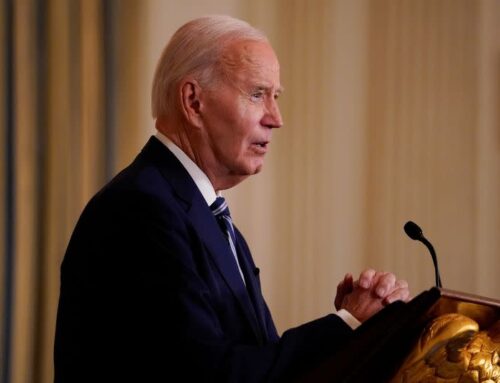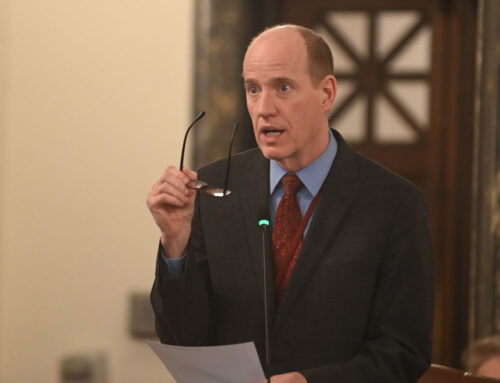U.S. Rep.-elect Dexter sets long-term goals for Congress on health care, environment
January 2, 2025
Maxine Dexter could have spent the last few weeks of the year relaxing with loved ones while preparing to represent the congressional district that spans Portland, Hood River and Mount Hood.
Instead, after sealing her victory in Oregon’s 3rd Congressional District in November, she continued to do what she’s done for nearly two decades: pulled 10-hour shifts for six days straight in intensive care and tended to patients with lung disease.
Dexter, a former state representative, has been a critical care doctor and pulmonologist at Kaiser Permanente for nearly two decades. She chose to work pretty much to the end of the year to support her patients and colleagues.
“Health care systems aren’t doing very well right now, so they’re not necessarily able to replace me,” Dexter told the Capital Chronicle. “And I felt like I needed to get my team or my partners through the holidays.”
Dexter, who just turned 52, will be sworn into Congress on Friday along with other newly elected members, including Janelle Bynum, who won Oregon’s 5th Congressional District seat. Both women, Democrats who have served in the majority in Oregon’s House, will enter the partisan fray in Washington D.C. in the minority, with Republicans in control of the House, Senate and White House.
Republicans also controlled the House over the past two years, a time that’s been marked by political brawls but scant action. Though they will continue to hold the power in the House, they hold a majority of only five seats, and that could mean more chaos, analysts say.
Dexter, a progressive who backs easing access to abortions, enacting gun control and moving toward a single-payer health care system, said she will not prejudge any of her congressional colleagues. She said she will work with anyone with whom she can find common ground on an issue. But when pressed about the agenda of the incoming Trump administration and his pledge to deport illegal immigrants and expand fossil fuel drilling, she acknowledged a potentially tough road ahead for a progressive like herself.
“I’m deeply concerned,” she said. “We are not headed in the right direction.”
Her two children, both in college, agree, and they don’t have much faith in government, she said. That’s one reason she decided to run.
In preparing for her new life, she leased an apartment within walking distance to the Capitol, attended orientation sessions with other freshmen and combed through policies and procedures. She also reached out to other physicians in Congress, including Minnesota’s Rep. Kelly Morrison, an OB-GYN, and consulted the other Democratic representatives in Oregon: Reps. Suzanne Bonamici, Val Hoyle, Andrea Salinas and retiring Rep. Earl Blumenauer, who’s 76 and has represented Oregon’s 3rd District for nearly three decades.
He and his staff have been working closely with Dexter to ease her transition.
“She’s a very quick study,” Blumenauer told the Capital Chronicle. “I don’t know that I’ve seen a new member of Congress get engaged as quickly and as thoroughly as Maxine. I could not be more impressed.”
Modest background
Dexter was not destined for Congress. She grew up with a brother in a working class family in Bothell, Washington, about 20 miles northeast of Seattle. Her father sold car parts, barely making enough to get by. Their home life was tumultuous and her parents got divorced.
She had no role models to pursue medicine or politics. Her home had no books, and no one in her family had earned a college degree. But Dexter’s family life prepared her for becoming a physician. She learned about mental illness from her mother, who struggled with profound issues, Dexter said, and she learned to care for patients from her grandmother, who had diabetes and suffered a series of amputations. Dexter embraced the role of being a nurse and tending to her grandmother’s wound care.
At school, she impressed her teachers and was assigned to classes for gifted students. One of her favorite teachers introduced her to the idea of college and asked what she’d like to be.
She decided she wanted to care for people, as she cared for her grandmother, and become a doctor.
At 16, she got a job at Albertsons, first working in the bakery, then as a checker and finally as a manager. She also joined the United Food and Commercial Workers International Union, which represents grocery store workers.
Her earnings helped pay for her college education in Seattle at the University of Washington. Though a pre-med student, she studied journalism and political science as an undergrad because she knew that in med school, she’d have little time for liberal arts. She worked as a sportswriter at the school newspaper and even freelanced some stories for the Seattle Times. She also read the New York Times voraciously, helped by the fact that she could buy it for $1 a week as a student.
Her college years, as for many, were a time of discovery.
“It was like the whole world was open to me at the University of Washington,” Dexter said. “There were so many really interesting things to study.”
She was interested in the political system, constitutional law and health policy and did a Ford Foundation internship on the subject that laid a foundation for her future path.
“I knew I was going to work on health policy someday,” Dexter said.
Dexter also found love at university.
She and her husband both earned their medical degrees from the University of Washington. He became a primary care physician and now works at Kaiser Permanente in Portland. She pursued a postgraduate fellowship in pulmonary and critical care at the University of Colorado in Denver because she enjoys responding to an emergency.
“I have always been someone who likes thinking on their feet and being the person who helps in a crisis,” Dexter said.
As a physician, she’s seen people at their worst, and she’s cared for many patients who’ve struggled in their lives. Some have had to decide between buying their medications or paying for child care.
“At the end of the day, we have got to create a society where people can live dignified, stable lives when they’re working full time,” Dexter said.

Two initiatives
After caring for patients for more than a decade, Dexter ran in 2020 for a northwest Portland seat in the Oregon House that had been held nearly two decades by then-retiring Democratic Rep. Mitch Greenlick, a former Kaiser Permanente research director and professor at Oregon Health & Science University. Dexter won the primary and was sworn into office that June after Greenlick died in office.
Dexter served nearly two terms in the state House and supported a range of Democratic issues, from safe gun storage and a ban on undetectable ghost guns to reform in the pharmaceutical industry and an expansion of Medicaid benefits to all low-income immigrants.
She also worked on bipartisan packages, including a $100 million drought and water security package in 2023 and a right to repair law which took effect Wednesday and is expected to make it easier and cheaper for consumers to fix their devices.
But she’s most proud of two initiatives. One stems from a patient in 2022. A young woman who took what she thought was a pain pill overdosed on what turned out to be fentanyl. Dexter said on her website that she worked all night trying to save the woman’s life.
“I was the one who had to give their mother, friends and extended family the heart-breaking news,” she said. “I realized this was a tragedy that could happen to anyone’s children, even my own. I had to take action.”
The following year she championed the passage of a package aimed at saving people from overdoses by making the opioid reversal drug, naloxone, more available in restaurants, stores, police departments and schools and other public buildings.
The other accomplishment she cites was also in 2023, when Dexter chaired the housing committee. Dexter played a central role in putting together a $200 million housing and homelessness package pushed by Gov. Tina Kotek that included rent assistance and money for shelter beds and to get 1,200 homeless people into housing.
A fellow Democrat, state Sen. Kate Lieber, remembered being impressed watching Dexter tackle a new issue, delve into the complexities and shepherd it through.
“She did a really great job, especially digging into something that she did not have any familiarity with,” Lieber said.
Dexter also helped pass last year’s $376 million housing package withmoney for shelters, renters and housing.
In Congress, she said she’ll support many of the same issues, but she hopes to move the needle on lowering emissions and expanding use of clean energy to improve air quality, something that affects people with lung disease in particular, and she wants to improve the country’s health care system by working toward an affordable, single-payer system that includes comprehensive behavioral health, vision, dental and prescription drug coverage.
As a physician, she’s experienced the impact of the high-cost U.S. system on patients, who have motivated her as a lawmaker. She said being a physician also has helped train her to work with other politicians.
“(As physicians), we take care of people. We don’t take care of Democrats and Republicans,” she said. “We care for them no matter who they are.”
In the Legislature, she said she developed close working relationships with Rep. Jeff Helfrich, a Hood River Republican who was on the housing committee, and former Rep. Daniel Bonham, who now represents The Dalles in the Senate. Both are in the 3rd District and supported her candidacy — as did others.
“There’s a really long list of Republican colleagues who really encouraged me to run because I have developed trust with my colleagues,” she said. “We don’t talk about abortion. We don’t talk about guns. Like there are certain things that you’re just never going to agree on.”
Dexter doesn’t always agree with fellow Democrats, either. Rep. Dacia Grayber, D-Beaverton, said she sometimes disagreed with Dexter and the two talked it out.
“She’s not afraid to have the hard conversations,” Grayber said. “I think that’s one of the most special things about Maxine.”
Dexter said being a physician gives lawmakers a “superpower” because they have stories of patients to tell about a range of social issues, bringing a face and humanity to the issue.
Eventually, she’d like to tell those stories on the powerful Energy and Commerce committee, which has jurisdiction over health care, the environment and energy issues. But for her first term, she’s asked for Veterans Affairs and Natural Resources. The former is relatively bipartisan, she said, and includes oversight of veterans health care, while the latter, though partisan, has jurisdiction over federal lands, tribal affairs and the Environmental Protection Agency.
She said it’s relevant to the environmental goals she hopes to achieve over time, and time could be on her side. Blumenauer served the Democratic district for 14 terms and likely would have won reelection if he had run again.
Blumenauer is optimistic about Dexter’s future — and so are Democrats in the state Legislature.
“I think she’s perfect for Congress,” Lieber said. “She’s sort of dogged in her pursuit of the issues, which, I think especially for Congress, you need somebody who is just going to be just really pointed in one direction and continues to walk down the path even with obstacles. I would say Maxine is really good at that.”
GET THE MORNING HEADLINES.
YOU MAKE OUR WORK POSSIBLE.
Search
RECENT PRESS RELEASES
Related Post



